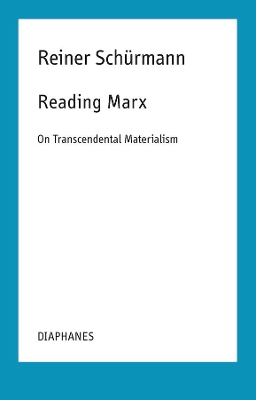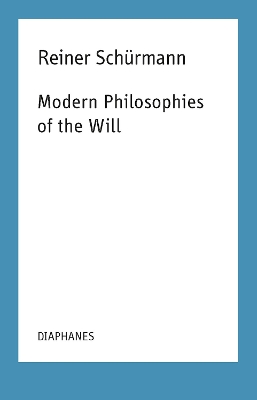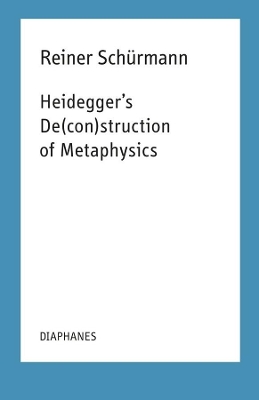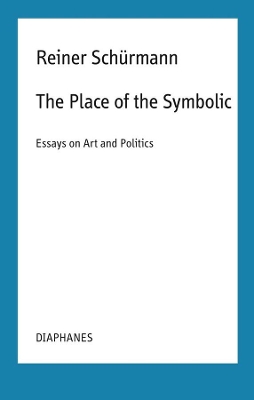Reiner Schurmann Selected Writings and Lecture Notes
4 total works
Reading Marx - On Transcendental Materialism
by Reiner Schurmann, Malte Fabian Rauch, and Nicolas Schneider
Published 18 May 2021
In this book, Reiner Schurmann argues that what is most original about Marx is his philosophical axis. Extending his highly original engagement with the history of philosophy, Schurmann draws out this axis, which determines and localizes his theories of history, social relations, and economy. Whereas Marxist readings of Marx conceive history, classes, and social relations as primary realities, Schurmann brings out a radically immanent understanding of praxis that introduces multiplicity. This edition is complemented by a reprinting of Schurmann's Anti-Humanism essay, in which he reads Marx alongside Nietzsche and Heidegger as spelling out the dissociation of being and action. Reading Marx showcases underappreciated facets of Schurmann's work and offers an interpretation of Marx that resonates with the readings of Jacques Derrida, Michel Henry, Antonio Negri, and Francois Laruelle.
Modern Philosophies of the Will
by Reiner Schurmann, Francesco Guercio, and Kieran Aarons
Published 13 May 2022
Through the lenses of Kant, Nietzsche, and Heidegger, this edited volume traces the development of the relation between the will and the law as self-given. Modern Philosophies of the Will explores a variety of topics including: the ontological turn in philosophy of the will; the will’s playful character and the problem of teleology; the will as principle of morality as discussed by Kant, of lifeforms as discussed by Nietzsche, and of technology as discussed by Heidegger; the formal identity of legislation; and transgression of the law. This volume traces three strategies in the development of the philosophy of will from Kant to Heidegger, through rationality and irrationality of the will, the ontological turn, and law.
In Being and Time, Heidegger announced the "Task of Destroying the History of Ontology" in order to free what had remained "unthought" in Western metaphysics. The unpublished part of that work was to be titled "Basic Features of a Phenomenological Destruction of the History of Ontology. According to the Guiding Thread of the Problem of Temporality." This latest work in the Reiner Schurmann Selected Writings and Lecture Notes series aims to carry out Heidegger's plan. The destruction, or, as it is later called, the deconstruction of metaphysics, has a negative side-the peeling off, or the archeology, of metaphysical history by means of the guiding thread of the question of Being-and a positive side-"retrieval" of the original experience of Being in ancient Greek philosophy.
"The destruction has no other intent than to win back the original experience of metaphysics through a deconstruction of those conceptions which have become current and empty." The purpose of taking to pieces the fabric of Western metaphysics is to show how at each important stage "the question of the meaning of Being has not only remained unattended to or inadequately raised, but that it has become quite forgotten in spite of all our interest in 'metaphysics'."
"The destruction has no other intent than to win back the original experience of metaphysics through a deconstruction of those conceptions which have become current and empty." The purpose of taking to pieces the fabric of Western metaphysics is to show how at each important stage "the question of the meaning of Being has not only remained unattended to or inadequately raised, but that it has become quite forgotten in spite of all our interest in 'metaphysics'."
The Place of the Symbolic - Essays on Art and Politics
by Reiner Schurmann, Malte Fabian Rauch, and Nicolas Schneider
Published 20 December 2022
This book weaves together Reiner Schurmann's work on art and politics, drawing on a range of the most important thinkers and poets of the twentieth century and beyond.
The Place of the Symbolic gathers Reiner Schurmann's essays on the nexus of art and politics. In keeping with his translation of the destruction of metaphysics into an an-archic philosophy of practice, Schurmann develops a radical theory of the place of symbols, irreducible either to idealist theories of symbols or structuralist accounts of the symbolic. Symbols, Schurmann argues, may provide a bridge between ontological difference and politics. They resist being grasped metaphysically, in terms of representation. Instead, their understanding requires a specific way of existence: attending to the coming-to-presence of phenomena. As such, the understanding of symbols discloses a form of praxis that abandons ultimate grounds and opens onto the manifold.
Alongside Schurmann's theory of symbols, the collection includes essays on the relation between metaphysics, tragedy, and technology; on the "there is" in poetry; as well as on judgment. Throughout these characteristically lucid interventions, Schurmann's most urgent concern remains a consideration of singular and finite practices that enact a release from universal principles. Art and politics appear here as the unworking of ultimate grounds; that is, as practices attuned to a truly groundless form of life.
The Place of the Symbolic gathers Reiner Schurmann's essays on the nexus of art and politics. In keeping with his translation of the destruction of metaphysics into an an-archic philosophy of practice, Schurmann develops a radical theory of the place of symbols, irreducible either to idealist theories of symbols or structuralist accounts of the symbolic. Symbols, Schurmann argues, may provide a bridge between ontological difference and politics. They resist being grasped metaphysically, in terms of representation. Instead, their understanding requires a specific way of existence: attending to the coming-to-presence of phenomena. As such, the understanding of symbols discloses a form of praxis that abandons ultimate grounds and opens onto the manifold.
Alongside Schurmann's theory of symbols, the collection includes essays on the relation between metaphysics, tragedy, and technology; on the "there is" in poetry; as well as on judgment. Throughout these characteristically lucid interventions, Schurmann's most urgent concern remains a consideration of singular and finite practices that enact a release from universal principles. Art and politics appear here as the unworking of ultimate grounds; that is, as practices attuned to a truly groundless form of life.



